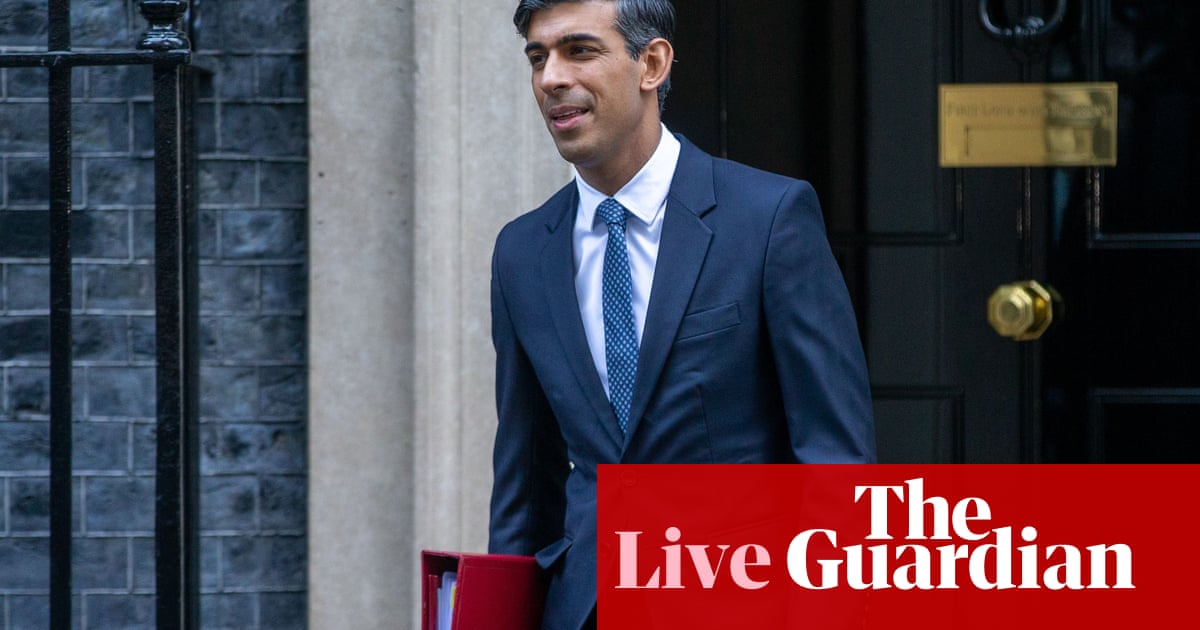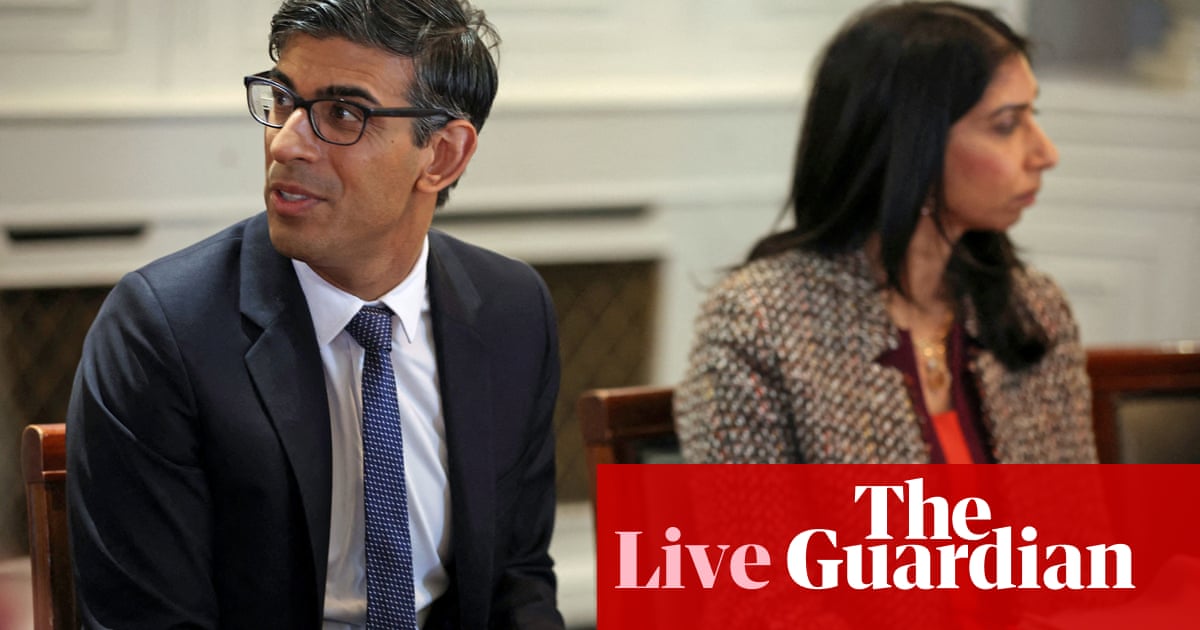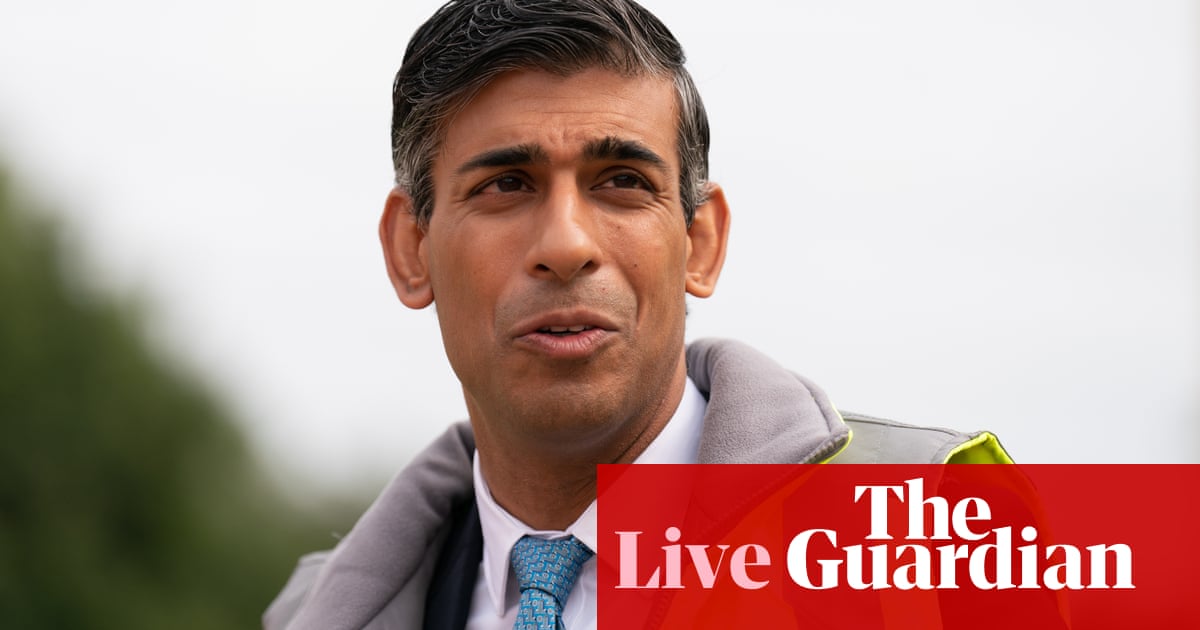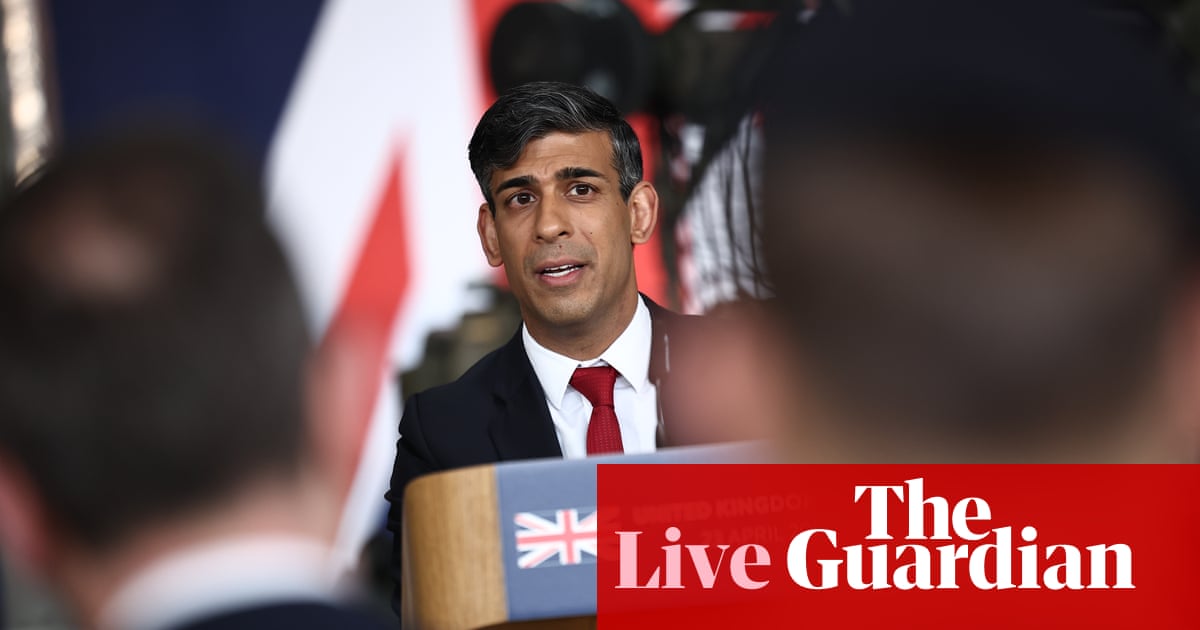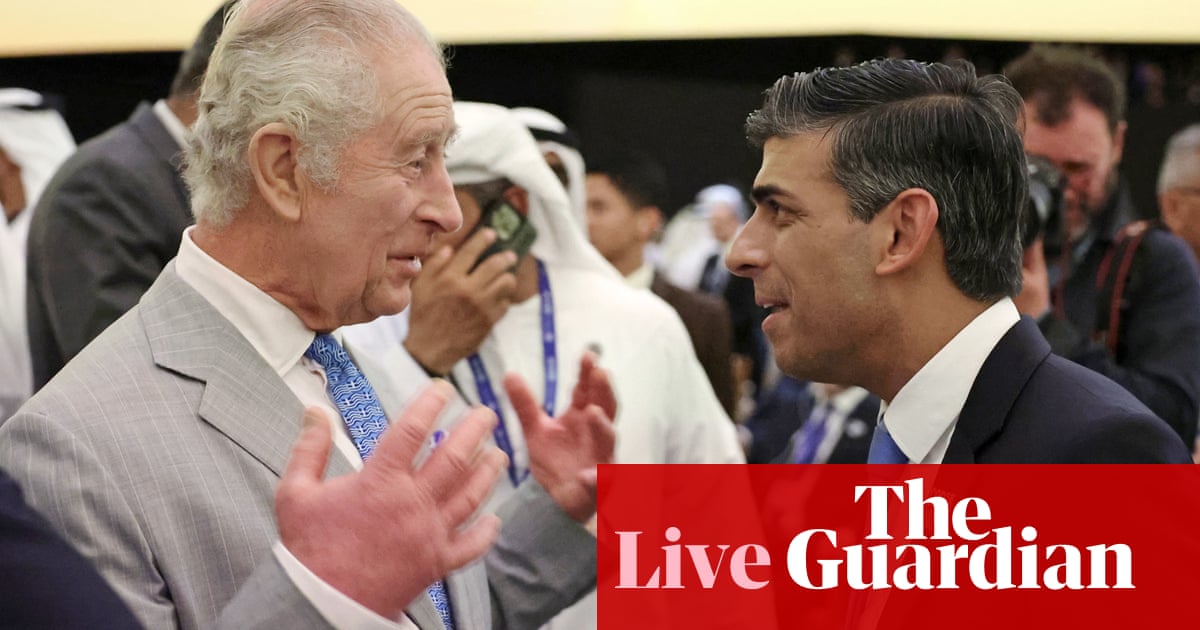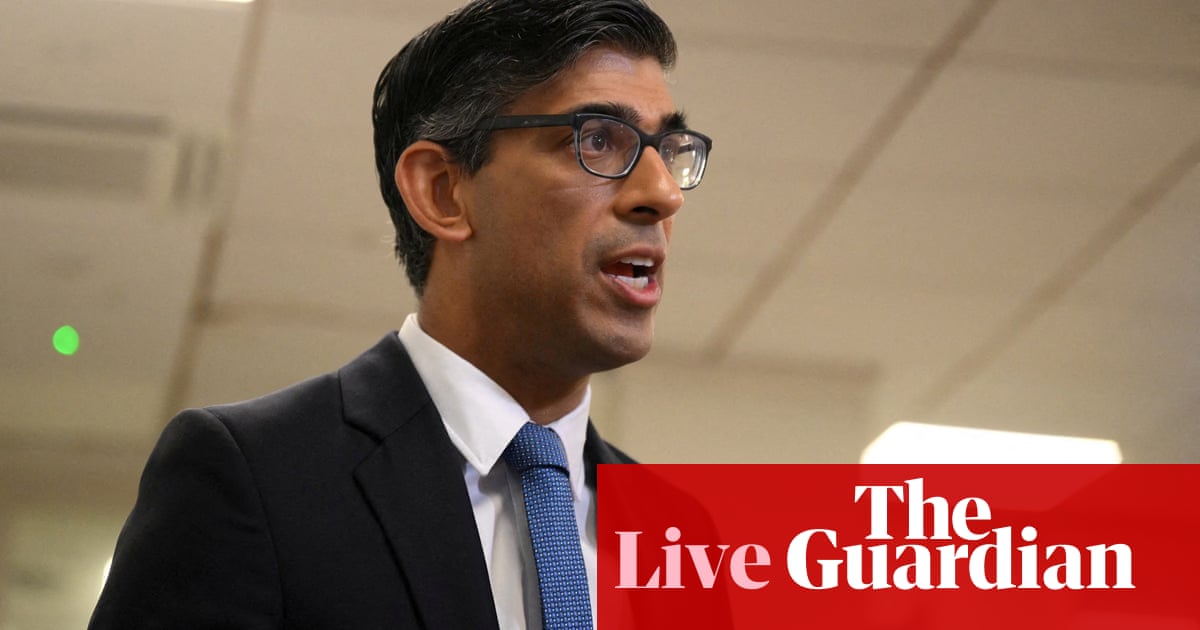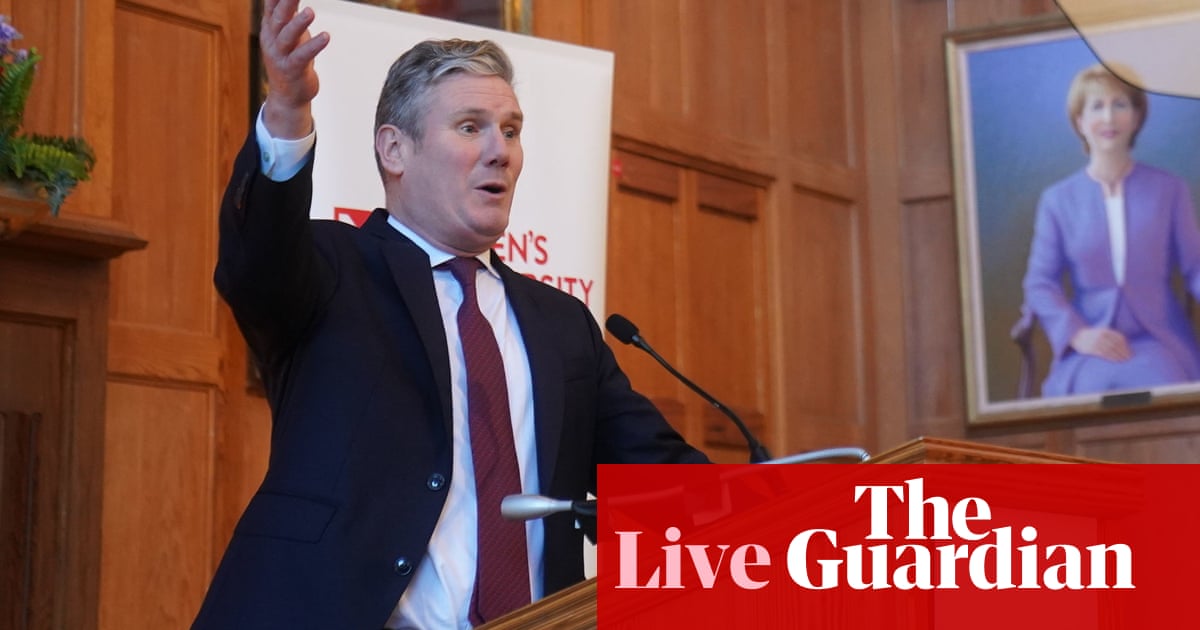
Sunak says he wants to await outcome of inquiry into Gavin Williamson complaint before deciding his future
Rishi Sunak was also asked by the BBC’s Chris Mason about Gavin Williamson, and he restated his view that the language used by Williamson towards Wendy Morton was unacceptable. He said Williamson was currently being subject to a complaints process. And, in what may not bode well for the minister, Sunak said he wanted to let that process run its course before he acted.
Asked why Williamson was allowed to continue as a minister if his language was not acceptable, Sunak replied:
There’s an independent complaint process that’s being conducted at the moment. It will be right to let that process conclude before making any decisions about the future.
In his first answer on this topic Sunak said the inquiry was already under way. He said that Williamson’s language was “not right [and] not acceptable”, and that he welcomed the fact Williamson had expressed regret about it.
Afternoon summary
Rishi Sunak has said he wants to await the outcome of the inquiry into the aggessive messages sent by Gavin Williamson to a fellow Tory MP before deciding whether or not to sack him from his ministerial post. See 3.35pm.
Sunak has stressed the importance of working with countries like France to cut the number of small boat Channel crossings, and said that talks with EU leaders on the subject at Cop27 left him with “renewed confidence and optimism” about being able to address the problem. See 4.32pm.
Sunak has pledged the UK’s continued support for conserving threatened forests around the world, through a funding programme covering a third of the world’s forests, at the Cop27 UN climate summit in Egypt.
China has criticised the British government for sending the trade minister Greg Hands to Taiwan and said the UK must cease “sending the wrong signals” to pro-independence forces on the self-ruled island that Beijing regards as its territory.
That is all from me. Our Cop27 coverage continues on our live blog.
Sturgeon says developed countries must pledge money to address loss and damage caused by climate crisis
Nicola Sturgeon, Scotland’s first minister, has said the developed countries should agree to pay money to developing countries to address the “loss and damage” they are experiences as a result of the climate crisis. In comments released ahead of the opening of Cop27, she said:
For many countries, particularly in the global south, this must be the Cop where the global north not only delivers on our promises to finance adaptation and mitigation, but recognises the need to address the loss and damage experienced by countries already impacted by climate change.
Last year, Scotland became the first developed nation to pledge finance to address loss and damage and others have now followed suit, including Wallonia and Denmark. This shows just how important the action of smaller governments can be, and I know many countries and campaigners hope to see other countries, particularly in the north, step up and make Cop in Egypt the loss and damage Cop.
Aid spending is primarily a responsibility for the UK government, but the Scottish government has committed £2m from its global justice fund to address loss and damage.
Here is a Guardian video about the protesters calling for the Manston processing centre for migrants to be closed.
Back to Gavin Williamson for a moment, and here are two articles about the row published today that are illuminating.
Paul Goodman at ConservativeHome says that, while the menacing elements of Williamson’s messages to Wendy Morton were unacceptable, “it would be dispiriting to see MPs forced to communicate in woke language that might be used in an American law firm”. He says the row shows how the culture at Westminster has changed.
It’s worth pointing out that it is novel to see two former chief whips, holders of a post renowned for its circumspection, to see their beans spilled all over the front pages of the Sunday papers, whatever the source of the story.
And to see a former party chairman in the mix. And for that same former chairman – another post renowned for its loyalty to the colours – to have openly attacked a cabinet minister.
Both incidents are symptoms of the replacement of a culture of discretion by a culture of disclosure – fuelled by the gradual erosion of the old post-war military culture in the Commons, the rise of celebrity, a decline in loyalism, whips with less patronage, the effect of social media and Covid lockdowns, and post-Brexit strains on Party unity.
This is not to say that the old ways were better than the new ones. They are better for the legislature and worse for the executive, better for lobby journalists and worse for Tory togetherness, better for openness and worse for privacy (and secrecy).
And Stephen Bush in the Financial Times says it is hard for Sunak to excuse Williamson while defending his own integrity.
The prime minister’s professed dismay at Williamson’s exchanges are similar to his claim that he brought Suella Braverman back to government in order to tackle crime and immigration (as if Braverman were the only member of the Conservative party to be bothered by those things). It’s obviously not true and it’s obvious he knows it’s not true.
The trouble for Sunak is that he can’t really come out and admit that his government was a co-creator of an economic crisis and that he is too weak to tackle that crisis, without looking weak and annoying people within his own party. But he also can’t defend his government without looking and sounding like a man who spouts obvious falsehoods. That undermines one of the few assets he and his party has: his own standing in the country as a whole.
Government axes Johnson"s plan for £250m national flagship to replace Royal Yacht Britannia
A £250m scheme to create a successor to the Royal Yacht Britannia has been scrapped as part of a squeeze on government spending, PA Media reports.
The national flagship plan was sunk by Rishi Sunak’s administration as Whitehall braced for cuts in the 17 November autumn statement by chancellor Jeremy Hunt.
The plan was championed by Boris Johnson when he was prime minister, but has faced criticism from MPs at a time when there are other priorities for defence spending.
Defence secretary Ben Wallace told MPs this afternoon he was prioritising the procurement of the multi-role ocean surveillance ship (MROSS) instead of the flagship.
“In the face of the Russian illegal and unprovoked invasion of Ukraine and [Vladimir] Putin’s reckless disregard of international arrangements designed to keep world order, it is right that we prioritise delivering capabilities which safeguard our national infrastructure,” he said.
That meant he had “also directed the termination of the national flagship competition with immediate effect to bring forward the first MROSS ship in its place”.
The vessel had been expected to be constructed in the UK and take to the water in 2024 or 2025, and would have toured the world as a “floating embassy”.
But the Daily Telegraph, which has been campaigning for a replacement for Britannia, reported that the two private consortia bidding for the work were told on Monday morning that the project is being axed.
The Commons defence committee warned in 2021 that there was “no evidence of the advantage to the Royal Navy of acquiring the national flagship” and that the initial expenditure of around £250m combined with the £20-30m a year running costs and providing a crew, would pile extra pressure on the senior service.
Last month Alec Shelbrooke, a defence minister, revealed that £2.5m has already been spent on developing plans for the national flagship.
Sunak stresses importance of working "constructively" with EU countries to cut number of small boat Channel crossings
And here is a full summary of the lines from Rishi Sunak’s interview with the BBC’s Chris Mason.
Sunak said he had “renewed confidence and optimism” about being able to tackle the problem of small boat Channel crossings after his talks with fellow European leaders at Cop27. He said he had discussed the issue with the French president, Emmanuel Macron, and other EU leaders. He said:
I’m actually leaving with renewed confidence and optimism that, working together with our European partners, we can make a difference, grip this challenge of illegal migration and stop people coming illegally.
He said cooperation with other European countries on this was essential. He said:
We need to reduce the number of people coming here illegally. And that’s going to require the home secretary and others to work constructively with partners around Europe to stop people coming in the first place. And there’s a range of things we need to do to make that a reality.
He said more details about the government’s plans would be announced in the coming weeks.
Sunak’s emphasis on the importance of cooperation with the French and others to address this problem marks a change of tone from the 10-point plan to end illegal immigration that he announced when running for the Tory leadership in the summer. Only two of those proposals involved working with European partners, and even those were not phrased in diplomatic language. One idea was summarised as “holding the French to account with clear targets for stopping boats”, and the other as “sending failed asylum seekers and foreign criminals back home”.
But Sunak also said there was “not one simple solution” to the small boats problem. And he refused to answer when he was asked when the government would be able to start cutting the number of people the Channel in small boats, or by how much. (See 3.21pm.)
Sunak said the government was making “very good progress” on cutting the number of people being held at the Manston migration centre. He ducked a question on whether Suella Braverman, the home secretary, was to blame for creating the overcrowding problem there in the first place. His interview coincided with Robert Jenrick, the immigration minister, telling MPs that numbers at Manston are now below the official 1,600 capacity. (See 3.42pm.)
Sunak said he wanted to await the outcome of the CCHQ inquiry into the complaint about Gavin Williamson using aggressive language in messages to Wendy Morton, the then chief whip, before deciding his future. (See 3.35pm.)
Sunak said he hoped to met the Egyptian president later today and that he intended to raise the case of imprisoned writer Alaa Abd El-Fattah, who is on hunger strike.
Sunak would not rule out Matt Hancock, the former health secretary, having the Tory whip restored before the next election. Hancock has had the whip withdrawn for taking part in I’m a Celebrity. Sunak restated his disappointment with Hancock’s decision. Asked if Hancock would be able to get the whip back, he said that was a decision for the chief whip.
He claimed that the fact that Boris Johnson attended Cop27 reflected well on Britain. He said:
It’s great that the former prime minister is here … It just demonstrates our leadership on this issue globally.
Sir Roger Gale (Con), the MP who tabled the urgent question on Manston and whose constituency covers the processing centre, said the problem with over-crowding was “wholly avoidable”.
That was a reference to Suella Braverman, the home secretary, whose handling of Manston Gale has repeatedly criticised.
Gale asked for an assurance that the temporary units set up at Manston to provide accommodation would be dismantled. He said that it was meant to be a processing centre, not an accommodation centre, and that if the new units stayed up, it could be used for accommodation again.
Robert Jenrick, the immigration minister, said he would consider this request, but that he did not think that would be possible “right now”. He said it would be prudent to keep the temporary shelters up in case they were needed again soon.
Immigration minister Robert Jenrick tells MPs number of migrants at Manston now back below its 1,600 capacity
In the Commons Robert Jenrick, the immigration minister, is responding to the urgent question about Manston processing centre for migrants.
He says people in safe countries should not be travelling to the UK to claim asylum.
He says the French have stopped more than 29,000 crossings this year, and destroyed more than 1,000 boats.
But 40,000 people have crossed the Channel this year, he says.
He says it was necessary to hold some people at Manston for longer than usual. But the Home Office is now sourcing more bed spaces, he says.
He says at 8am this morning the population at Manston was back below 1,600 – its official capacity.
He says this is a big improvement on last week.
Sunak says he wants to await outcome of inquiry into Gavin Williamson complaint before deciding his future
Rishi Sunak was also asked by the BBC’s Chris Mason about Gavin Williamson, and he restated his view that the language used by Williamson towards Wendy Morton was unacceptable. He said Williamson was currently being subject to a complaints process. And, in what may not bode well for the minister, Sunak said he wanted to let that process run its course before he acted.
Asked why Williamson was allowed to continue as a minister if his language was not acceptable, Sunak replied:
There’s an independent complaint process that’s being conducted at the moment. It will be right to let that process conclude before making any decisions about the future.
In his first answer on this topic Sunak said the inquiry was already under way. He said that Williamson’s language was “not right [and] not acceptable”, and that he welcomed the fact Williamson had expressed regret about it.
Sunak says it would not be honest to say there is "one simple solution" to problem of small boat Channel crossings
Rishi Sunak has said there is “not one simple solution” to the problem of people crossing the Channel on small boats. In an interview with the BBC’s Chris Mason, Sunak refused to answer when asked when the government would be able to start cutting the number of people making that crossing, or by how much. He replied:
We all want this situation to resolve itself as quickly as possible. I also want to be honest with people that it’s a complex issue. It’s not one simple solution that’s going to solve it overnight. I wouldn’t be being honest if I said that there was. There’s a range of things we need to do.
But what I want people to be reassured by is that I absolutely am determined to grip this. I’ve been spending an enormous amount of my own time on it. I’ve been talking to several European leaders about it today. And there’s a range of things that we will action as quickly as we can to get a grip of the situation and reduce the amount of illegal migration that we’re seeing.
I will post more from the interview shortly.
The former environment secretary, George Eustice, has defended Gavin Williamson over his messages to Wendy Morton. In an interview with Times Radio, Eustice said that the row about the messages was “a minor storm in a teacup in the scheme of things” and that he was surprised Morton submitted a formal complaint to CCHQ. “People do sometimes have rash moments, say things that they shouldn’t say, and it probably should just be dealt with in a less onerous way than going through some process, in my view,” Eustice said.
EU and UK not "worlds apart" on solving Northern Ireland protocol problem, says Šefčovič
The EU and UK positions on the protracted Northern Ireland Brexit dispute are not “worlds apart” and can be solved, the European Commission vice president Maroš Šefčovič has said.
He was speaking as it emerged that Brussels was about to start testing a live data feed from HMRC listing the precise goods arriving in Northern Ireland from Great Britain.
The access represents a significant breakthrough in negotiations between Brussels and London and will give both sides evidence for the first time on what goods entering ports in Northern Ireland stay in the country and what precisely goes over the border to the republic.
Speaking at a specially convened Westminster assembly of 70 parliamentarians from both the EU and the UK, Šefčovič said both sides more or less agreed on the need to allow goods destined to remain in Northern Ireland to pass unimpeded from Great Britain to Northern Ireland.
But there was some minor disagreement on level of checks for smuggled goods. He told the new EU-UK Parliamentary Partnership Assembly (PPA):
Our respective positions are not worlds apart.
A lot has been said about “a UK’s green lane” versus “an EU’s express lane”.
The issue here boils down to “no checks” versus “minimum checks”, stemming from Brexit itself.
The UK wants no checks on goods destined to remain in Northern Ireland but the EU is arguing minimum checks are needed to guard against rogue goods not complying with EU standards or diseased good products going across the border into the republic.
The UK’s minister for Europe, Leo Docherty, told the PPA that his “priority” was to “strengthen the relationship”.
Rishi Sunak and Ursula von der Leyen, the European Commission president, reiterated their commitment to finding a resolution to the Northern Ireland protocol problem in their bilateral, No 10 said. In the readout a spokesperson said:
On the Northern Ireland protocol, the prime minister reiterated the need to find solutions to the very real problems it had created on the ground in Northern Ireland. They agreed on the importance of working together to agree a resolution.
Downing Street has released a readout from Rishi Sunak’s three bilateral meetings at Cop27 so far – with Ursula von der Leyen, the European Commission president, with Mohammed bin Zayed al-Nahyan, the crown prince of the United Arab Emirates, and with Giorgia Meloni, the Italian prime minister. As usual, the readouts of these meetings are remarkably bland, but No 10 does say the meeting with Meloni, who heads a far-right coalition, was “positive”. It says:
The leaders had a positive discussion on a range of shared issues and priorities, including tackling illegal migration and people-smuggling gangs.
Reflecting on the UN climate summit, they noted the importance of addressing climate change for our long-term security and prosperity.
The prime minister highlighted the shock to global energy and food prices caused by Russia’s invasion of Ukraine, and the leaders agreed to continue to take strong action to support Ukraine and hold Russia to account for its actions.
The prime minister and prime minister Meloni welcomed the opportunity to meet at the start of their respective premierships and looked forward to working closely together, building on the strong partnership between the UK and Italy.
Starmer dismisses claims that Labour purging leftwingers, saying party just ensuring it gets "very best" candidates
Keir Starmer has dismissed claims that leftwing candidates are being purged by Labour ahead of the next election. Speaking to reporters this morning, he said the priority was getting “the very best candidates” in place. He said:
We are preparing for the next election, the sooner the better.
I am determined to have a team of incoming MPs, who are the team for the future.
We will have a big challenge and so of course we are making sure we have got the very best candidates to put before the public for that general election which we so desperately need.
At the weekend the Telegraph ran a story saying “a number of leftwing candidates have been blocked from standing for Labour at the next election in what sources have said is a biased move against supporters of Jeremy Corbyn.” But one of the best recent accounts of what has been happening is in today’s Times, where Patrick Maguire has a column saying that of the 39 candidates selected so far in the seats that Labour must win if it is going to form a government, not one has been won by a leftwinger. Maguire says:
Two years ago, Starmer promised to give local members full control over selections. Yet since day one of his leadership he has delegated the important but dirty business of professionalising/preparing for government/purging — it’s all the same thing — to a tight circle of flea-bitten faction fighters from the party’s old right and New Labour wings, and conscientious objectors who kept the Blairite faith during the Corbyn years. In so far as they vet candidates, insiders insist, it is to stop anyone capable of bringing a Labour government into disrepute getting anywhere near a ballot paper, even in the safest of Tory seats.
Maguire says Starmer’s allies say people are being excluded not on the grounds of ideology, but on the grounds of competence. But it is leftwingers who are losing out.
Scottish Tory leader Douglas Ross says he would sack shadow minister using language like Gavin Williamson"s
Douglas Ross, the Scottish Conservative leader, said that he would sack an MSP from a shadow ministerial job if they sent message to a colleague like those sent by Gavin Williamson to Wendy Morton. In an interview with Times Radio, he said language of that kind was unacceptable. Asked if he would sack someone from the frontbench for communication like that, he replied:
Yes, they wouldn’t be in my frontbench with the language that’s been used.





